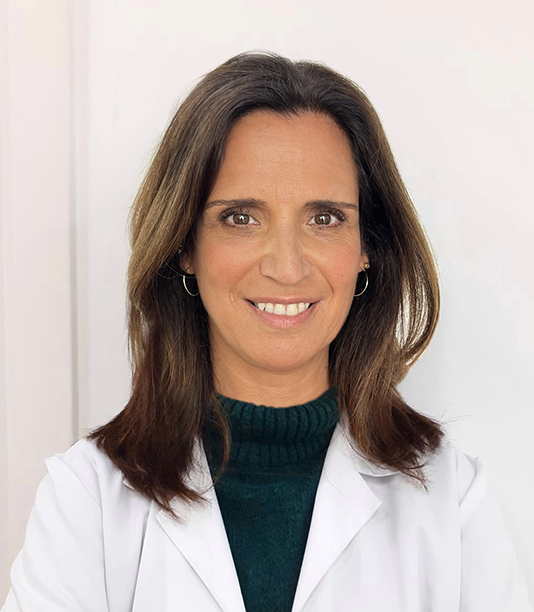Endometriosis Consultation
Endometriosis is a gynaecological condition that affects women physically, mentally, and socially. To support you throughout this process, it is essential to have a specialist who can guide you with a multidisciplinary, personalised, and integrative approach.
Endometriosis: a multifactorial chronic disease
Endometriosis is a chronic, benign, and oestrogen-dependent gynaecological condition, characterised by the presence of endometrial tissue outside the uterine cavity, affecting organs such as the ovaries, uterus, and fallopian tubes. It affects between 10% and 15% of women of reproductive age and is associated with symptoms such as intense pelvic pain, painful menstruation, and infertility.
Women with endometriosis are at higher risk of chronic pelvic pain, affecting 69% of patients, and infertility, which impacts 30% to 50% of those with the disease. Inflammation in the affected areas contributes to the worsening of symptoms, which include chronic pelvic pain, deep pelvic pain, dyspareunia (pain during sexual intercourse), with a prevalence of 45%, and pain in the sacral region.
Symptoms related to bowel function, such as painful defecation (dyschezia), diarrhoea, and abdominal bloating, are also common. Endometriosis can also cause urinary symptoms, such as painful urination, particularly when the lesions deeply infiltrate the organs.
The aetiology of endometriosis is not yet fully understood, but genetic, immunological, and environmental factors are known to influence its progression. Hormonal changes, especially in oestrogen and progesterone, play a key role in promoting the proliferation of endometriotic cells and perpetuating the chronic inflammatory state.
The Importance of Multidisciplinary Intervention
If you already have your gynecologist's diagnosys, a multidisciplinary approach is crucial for the well-being of women with endometriosis. Nutrition plays a vital role in helping to control weight, reduce inflammation, and improve quality of life. Additionally, lifestyle factors such as regular physical activity and stress management can be equally important. In some cases, supplementation and complementary therapies, such as acupuncture, should also be considered, offering an integrative, personalised, and effective approach to managing this condition.
Doctors who perform this medical procedure

Filipa Marques Bernardo
Engenheira química de base, licenciada em Nutrição pela Escola Superior de Tecnologia da Saúde de Lisboa, com formação complementar em Medicina Chinesa pela Universidade de Chengdu (China) e Master em Suplementação Nutricional baseada na evidência científica.
Dedica-se à saúde integrativa da mulher, com especial foco na menopausa e endometriose, combinando nutrição clínica uma com avaliação através de exames laboratoriais e uma abordagem integrativa suportada pela Medicina Chinesa, num acompanhamento completo e personalizado complementar à abordagem médica convencional.
Criou um programa integrativo de tratamento natural, especialmente dirigido a mulheres em fase de pré-menopausa ou menopausa que não podem, ou preferem não recorrer à terapia de reposição hormonal. Este programa inclui uma consulta detalhada com avaliação inicial dos sintomas, exames bioquímicos para identificação de carências ou desequilíbrios nutricionais e hormonais, e um plano terapêutico personalizado com nutrição, suplementação e fitoterapia adaptados às necessidades específicas de cada mulher.
É autora de diversas palestras e co-autora de artigo científico (em revisão) sobre o papel da dieta FODMAP na sintomatologia da endometriose.
Áreas principais da consulta:
- Menopausa e pré-menopausa sem reposição hormonal
- Endometriose, síndrome dos ovários poliquísticos e fertilidade
- Saúde integrativa da mulher

Filipa Marques Bernardo
A chemical engineer by training, with a degree in Nutrition from the Escola Superior de Tecnologia da Saúde de Lisboa, additional training in Chinese Medicine from Chengdu University (China), and a Master’s in Evidence-Based Nutritional Supplementation.
She specialises in women's integrative health, with a particular focus on menopause and endometriosis, combining clinical nutrition with laboratory assessments and an integrative approach supported by Chinese Medicine. Her approach provides comprehensive and personalised care that complements conventional medical treatment.
She has developed an integrative natural treatment programme specifically designed for women in the pre-menopause or menopause phase who cannot or prefer not to undergo hormone replacement therapy. This programme includes a detailed consultation with an initial symptom assessment, biochemical tests to identify nutritional or hormonal imbalances, and a personalised therapeutic plan incorporating nutrition, supplementation, and phytotherapy tailored to each woman’s specific needs.
She has delivered several lectures and is the co-author of a scientific article (currently under review) on the role of the FODMAP diet in endometriosis symptoms.
Main areas of consultation:
-
Menopause and pre-menopause without hormone replacement therapy
-
Endometriosis, polycystic ovary syndrome, and fertility
-
Women's integrative health

